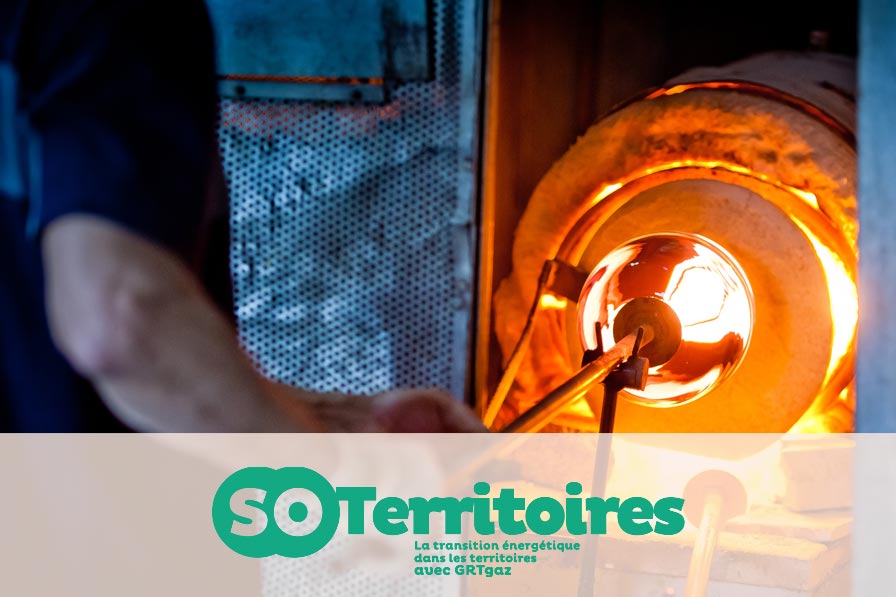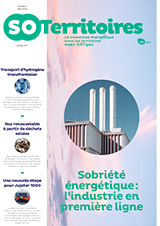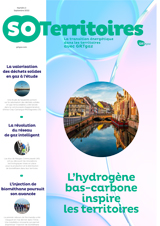GRTgaz: a trusted advisor on decarbonisation

Sylvie Jadoul has a tight grip on the energy challenges facing industrial companies. Since 2019, in association with GRTgaz’s Research & Innovation Center for Energy (RICE) and the Industrial Alliance for Competitiveness and Energy Efficiency (ALLICE), her team has been identifying the latest decarbonisation solutions to advise its industrial customers in the regions. This decarbonisation has three focal points: energy efficiency, the energy mix, and Carbon Capture & Storage (CCS).
“We promote solutions that are sometimes less mature but which have high potential,”Sylvie Jadoul
Industry decarbonization project manager at GRTgaz
“We promote solutions that are sometimes less mature but which have high potential,” says Sylvie Jadoul. Industrial Fatal Heat Recovery (ORC), for example, is attracting strong interest. In terms of the energy mix, the direct purchase of biogas via a Biomethane Purchase Agreement (BPA)1 is also proving popular amidst soaring natural gas prices. The use of hydrogen or the development of zero-carbon industrial boilers (which store and recover CO2 emissions) are other levers being studied. GRTgaz does not sell technical solutions. Rather, it positions itself as a trusted advisor, bringing customers and solution providers together. “We organise meetings, working days and other visits to anaerobic digestion units or innovative industrial sites, such as the Jupiter 1000 Power to Gas2 demonstrator.” In the autumn 2022, around 40 industrial companies visited the Goudale brewery in Arques (62), while 32 others visited a farm in Isigny-sur-Mer (14). “Our customers need to discover and compare solutions,” explains Sylvie Jadoul, whose team also helps industrial companies interpret regulations so they know exactly where they stand.
1 Private long-term energy purchase agreement (generally of fifteen years’ duration).
2 Water electrolysis from renewable and decarbonised electricity.
First-hand experience
Laurent Sieye, Head of the Ugitech Eco-responsible Development division1 in Ugine, France
“In spring 2022, we implemented a Group-level decarbonisation roadmap. Based on the Science Based Targets initiative (SBTi2), we have set a target of reducing our carbon emissions by 42% in 2030 and 63% in 2035. This will involve many actions relating to energy efficiency, electrification of processes, and the recovery of fatal heat. But renewable gases will also play a central role by replacing natural gas in our furnaces with decarbonised hydrogen and biomethane. Ugitech is the coordinator of a European hydrogen consortium. In 2026, we hope to install a first hydrogen burner demonstrator in a furnace, connected to an on-site electrolyser. At the same time, we are counting on GRTgaz to support us with biomethane. Everything still has to be built. Alongside GRTgaz, we will meet local producers who share our belief that direct purchasing via the Biomethane Purchase Agreement (BPA) is a high-potential solution.”
1 Swiss Steel Group
2 International Reference Framework
Nicolas Mat, General Secretary of the PIICTO1 non-profit organisation, Fos-sur-Mer, France
“PIICTO is an industrial platform in the industrial-port zone of Fos-sur-Mer. It brings together around 20 industrial sites and major institutional or economic stakeholders, such as GRTgaz. We have responded to the French Environment and Energy Management Agency’s (ADEME) low-carbon industrial zone (ZIBaC) Call for Projects, as our multi-modal platform is an energy hub facing a major decarbonisation challenge, with 1.4 Mt of CO2 emitted per year by industrial processes. Decarbonisation initiatives and industrial synergies are increasing (steam networks, CCUS2, diversification of the energy mix, etc.). Developing regional, structuring value chains is a sound strategic choice, which is why we have extended our geographical scope for ZIBaC beyond the Fos platform. We also have the support of our innovation partners, competitiveness clusters, the Aix-Marseilles Provence Metropolis and the Région Sud, to name but a few. There is a collective determination to succeed in this decarbonisation goal. There are many ways to achieve our objectives, from the electrification of processes to the use of decarbonised hydrogen and its by-products (ammonia, methanol). And all of this while reinventing new, collective and more circular systems. An industrial-port region can act as a fantastic decarbonisation laboratory.”
1 Caban Tonkin industrial and innovation platform
2 Carbon Capture Utilization and Storage
Publications


Subscription form for the SoTerritories and soNews newsletters
To go further

